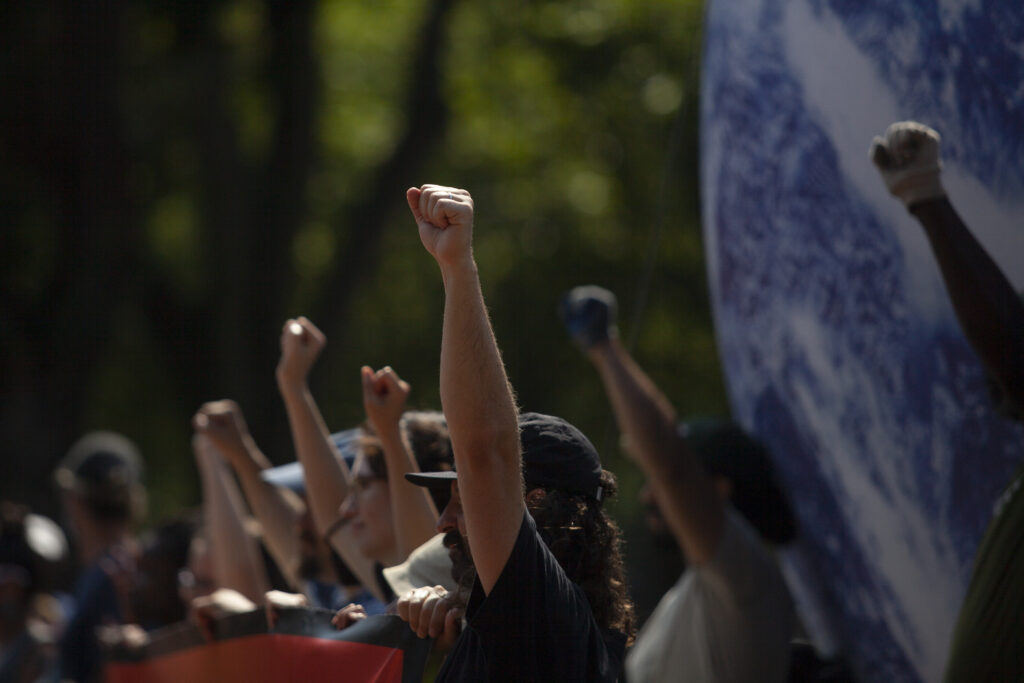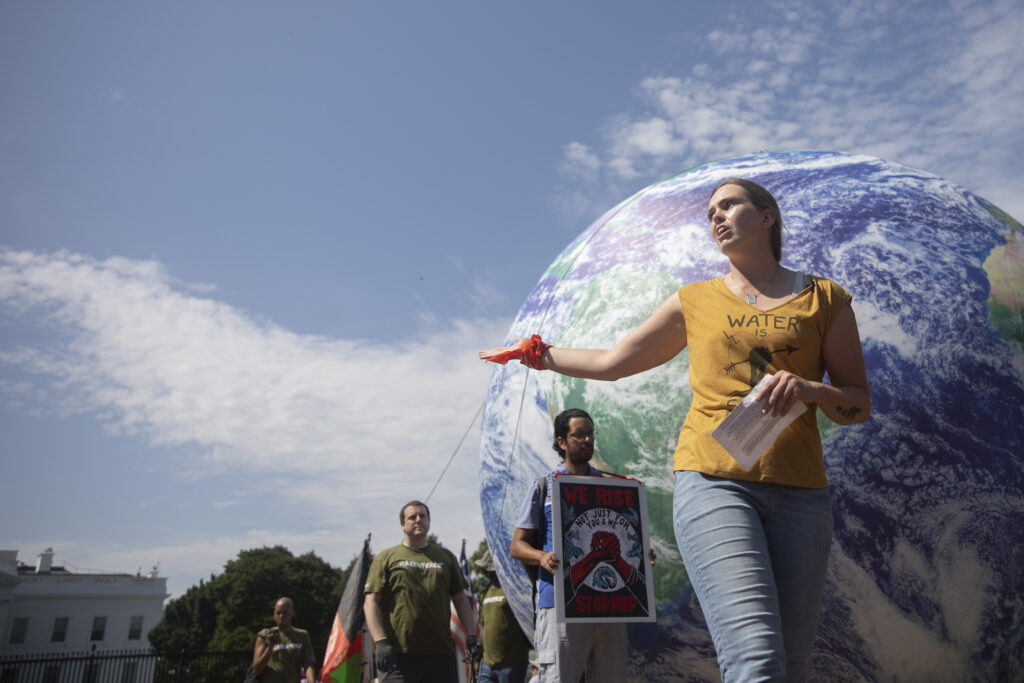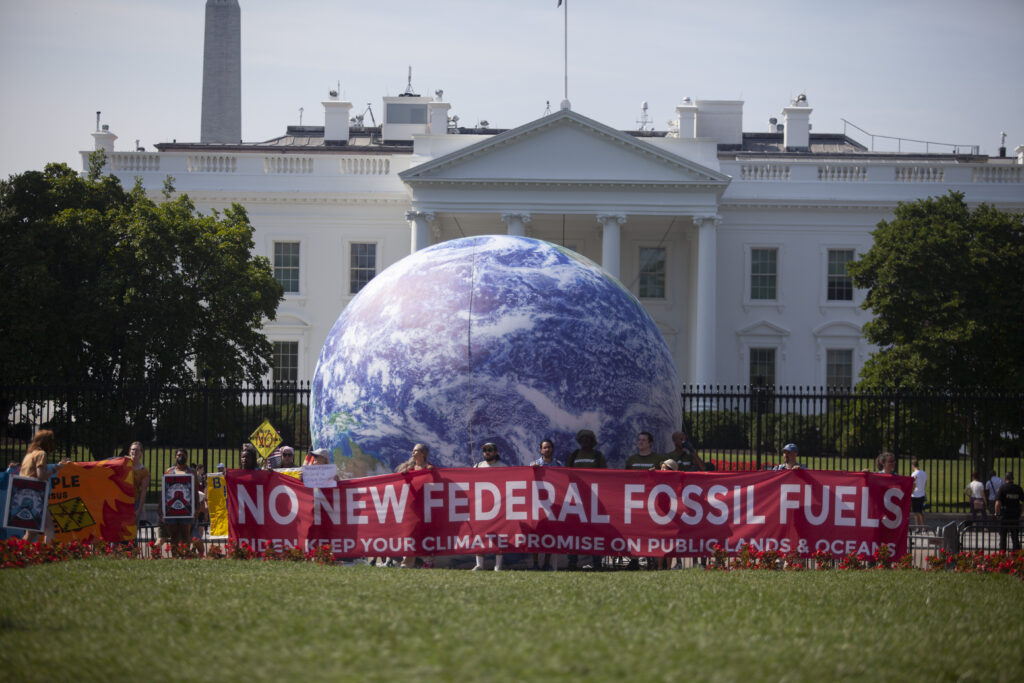Looking at the Inflation Reduction Act of 2022 through the lens of the Frontlines of Climate Justice
After a week of seemingly failed climate negotiations, Senator Manchin (D-W.Va) and Senator Schumer (D-N.Y.) recently announced a compromise and unveiled the Inflation Reduction Act of 2022. This development was the result of two years of negotiations as climate activists and frontline communities called on Congress and the Biden administration to deliver on their campaign commitments.
The Inflation Reduction Act, In a Nutshell.
What is the Inflation Reduction Act (IRA)? It’s a step in the right direction, albeit a cautious one. It’s not all that the U.S. owes the world, particularly those on the frontlines of the climate crisis, to address its responsibility as the country with the most historical emissions. This legislation is vast and covers many facets of the climate crisis–including addressing the need for safe housing, transportation, infrastructure, corporate accountability, wealth disparity, and more.
It shows that many in the United States will no longer accept climate inaction, that movement building drives change, and that one of the most critical steps to securing climate justice is the political will to make it happen. The legislation, however, is far from perfect and includes some major hand-outs to the fossil fuel industry.
For instance, one of the big red flags in this bill is the reformation of the permitting process, which may open the door to further drilling offshore and on federal lands. This legislation also keeps the prospect of a completed Mountain Valley Pipeline alive, despite fierce opposition from local communities and other major project issues.
We have to wonder: Is this really a fair compromise for the communities that stand to suffer from living in the shadow of destructive fossil fuel development? Can the U.S. really declare that it has secured climate justice for all when many are still harmed by pipelines, fracking sites, and other forms of fossil fuel infrastructure?

Slipping Through the Emissions Gaps:
The proposed legislation will invest $369 billion to accelerate the green transition. This is significantly less than the $2.1 trillion Build Back Better bill passed by the House. As scientist Peter Kalmus points out, it’s also much less than the U.S. military budget. In fact, he notes that the IRA is just 4.6 percent of the entire military budget. It’s clear that the Senate isn’t taking the threat of the climate crisis as seriously as it considers other threats.
Still, if passed, this bill would be the biggest climate legislation ever implemented in the United States.
According to the summary note provided by the Senate, these investments are projected to reduce emissions by 40 percent by 2030. This is better than nothing but still falls short of President Biden’s own goal to cut emissions in half by 2030 and to reach net-zero emissions by 2050. It fails to achieve the drastic action needed to avoid unlivable global conditions, as scientists explained in the most recent IPCC report.
At the global level, the Synthesis report by the United Nations Framework Convention on Climate Change (UNFCCC) measuring the climate commitments of parties to the Paris Agreement found that greenhouse gas emissions are projected to decrease by 12 percent by 2030. Scientists say that limiting warming to 1.5 C requires a global 45 percent reduction of CO2 emissions by 2030.
In 2021, the emissions gap report by the UN Environment Program specified that the U.S. was one of 10 G20 countries not on track to achieve its emissions target. The Inflation Reduction Act will partially correct this situation and potentially catalyze future action. Congress is moving in the right direction, but there is much more to do if the Biden administration is to effectively tackle the climate crisis.
The Good News:
President Biden made climate change a defining point for his agenda. For that, we can thank the work of young climate activists, Indigenous peoples, frontline communities, and others who shifted the conversation to make climate action a national priority. This is especially notable when considering the fact that climate wasn’t as much a part of the national conversation a few years ago as it is today. Two years into the Biden administration, Congress is finally moving ahead with necessary reforms. The sense of urgency is high – President Biden recently called climate change an existential threat to the nation and the world.
The latest IPCC report outlined the threats that North America is facing as a consequence of the climate crisis, including damage to ecosystems, infrastructure, and housing, peoples’ declining physical and mental health, disruption of livelihood, and financial disrepair. The weight of these climate consequences is heavier for those that bear the reality of systemic oppression, racism, and poverty. As broad as the threats are, so are some of the solutions outlined in the legislation, including:
- Tax credits for clean energy, including wind and solar.
- Grant program to make affordable housing more energy efficient.
- $60 billion to support environmental justice work and put money directly into underserved communities.
- Methane reduction plan to reduce the leaks from production and distribution of gas.
- Funds for climate solutions in rural communities, like climate-smart agriculture practices.
- $5 billion to support fire-resilient forests, forest conservation, and urban tree planning.
The Bad and the Ugly:
The legislation extends certain giveaways to the fossil fuel and extractive industries. Those on the frontlines of the climate crisis, experiencing its consequences first and worst, bear the brunt of these compromises.
The IRA includes funding for the extraction of critical minerals, like lithium, which is used in electric car batteries. It also prioritizes the transition to electric cars, including consumer tax credits to buy “used clean cars.” Boosting critical minerals raises questions about the environmental and social impacts on the communities where such projects would be developed, specifically on Indigenous communities like that of Thacker Pass. As we shared in April, the race for critical minerals must not leave frontline communities behind. The United States must commit to protecting human rights in critical mineral extraction. Otherwise, the transition to green energy risks repeating the human rights violations of the fossil fuel industry.
A big blow to climate action was the compromise that Democratic leadership made to ease the federal permitting rules for pipelines and other infrastructure in the coming months. This is highly concerning. Creating new climate-destructive projects only delays our transition away from fossil fuels. Indigenous communities that oppose new fossil fuel projects face violence and repression from the companies that build them. Last year, Indigenous defenders led the resistance against the Line 3 pipeline in Minnesota. They faced excessive use of force, extensive surveillance, and harassment from police funded by Enbridge, the corporation behind the project. More than 900 water protectors were arrested in non-violent resistance to the pipeline, and many still face criminal charges.
Some Indigenous organizations, like the Indigenous Environmental Network, assert that the IRA provides false climate solutions. Executive Director Tom BK Goldtooth shared: “From agriculture, soils and forests pushed into the voluntary carbon markets to aviation biofuels as offsets, to the expansion of carbon capture and storage (CCS) technologies and CO2 pipelines, this administration locks in the violence of the climate crisis and consequences to Indigenous Peoples, Indigenous nations and frontline communities for decades to come.”
Additionally, this legislation also guarantees the approval of the Mountain Valley Pipeline, a project that was essentially dead. Stretching through Virginia and West Virginia, this zombie project is billions of dollars over budget and years behind schedule. Communities that live along its path are fiercely opposed to it. If completed, it would constitute the single largest source of greenhouse gasses in Virginia. The project has been fined millions of dollars for damage to pristine waterways and private and public lands. And yet, the best piece of legislation we have to combat the climate crisis will resurrect this project.

Legislating Through the Lens of Climate Justice:
Prioritizing the well-being of those most vulnerable to the climate crisis means calling for a swift transition away from fossil fuels. It means stopping pipeline projects like Line 3, Line 5, and the Mountain Valley Pipeline that cut through and destroy Indigenous land. It means defending human rights and community care, and defunding the police. It also means protecting Thacker Pass and avoiding the same extractive practices for electric vehicles as fossil fuels. Ultimately, it would mean considering the input and the needs of the most vulnerable–not just powerful corporations, governments, and financial institutions.
This bill is a start, but it’s not nearly enough. This legislation still leaves behind those who are abandoned for the sake of “progress” – Black, Brown, Indigenous, and poor communities. Truly achieving climate justice would mean prioritizing the input, safety, security, and wellbeing of those communities. If the bill is to tackle the climate crisis effectively, provisions for new oil and gas leasing and infrastructure must be rejected from the legislation. The industry driving us to climate disaster is not part of the solution, and those on the frontlines must not be sacrificed.
As the IPCC report stated, solving the climate crisis is not only a matter of what needs to be done but also how. The Inflation Recovery Act is a step in the right direction, but we need to pick up the pace.







